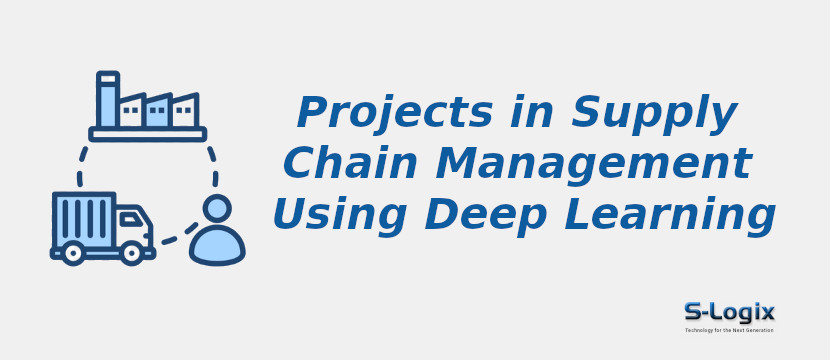Project Background:
Supply Chain Management (SCM) emerges from the growing recognition of the transformative potential of advanced technologies in optimizing and automating numerous aspects of supply chain operations. Traditionally, supply chains have been complex and prone to inefficiencies with challenges such as demand forecasting, inventory management, and logistics coordination. Integrating deep learning into SCM seeks to address challenges by leveraging the power of neural networks to analyze wider amounts of data and extract meaningful patterns. It includes the utilization of recurrent neural networks (RNNs) and long short-term memory (LSTM) networks, convolutional neural networks (CNNs), and reinforcement learning. The project aims to ensure supply chains agility and responsiveness by introducing intelligent systems capable of learning from historical data and optimizing various processes.
Problem Statement
- SCM revolves around the persistent challenges traditional supply chain systems face in demand forecasting, suboptimal inventory management, and inefficient logistics operations.
-
These challenges result from supply chain processes inherent complexity and market demands dynamic nature.
-
Traditional methods often struggle to adapt to the intricacies and uncertainties, leading to increased costs, delays, and resource wastage.
-
The SCM aims to address these issues by introducing intelligent models capable of learning and adapting from historical data by improving the accuracy of demand predictions and enhancing the efficiency of logistics and distribution networks.
-
The problem involves designing and implementing deep learning algorithms that can effectively analyze large-scale datasets and real-time decision-making processes.
-
Overcoming these challenges is crucial for creating a more responsive and adaptive supply chain that can better navigate the complexities of the modern business landscape.
Aim and Objectives
- Develop and implement deep learning solutions to enhance efficiency, accuracy, and adaptability in SCM.
-
Design deep learning models for improved demand forecasting to optimize inventory levels.
-
Implement image recognition techniques for precise inventory monitoring and management.
-
Utilize deep learning algorithms to optimize routing and logistics decisions in real time.
-
Enhance decision-making processes by integrating intelligent systems that learn from historical supply chain data.
-
Improve supply chain resilience through adaptive deep learning models that respond to dynamic market conditions.
-
Develop scalable and customizable applications that can be integrated into existing SCM systems.
-
Provide recommendations for adopting and integrating deep learning technologies in SCM for long-term operational benefits.
Contributions to Supply Chain Management using Deep Learning
1. Developing deep learning models for precise demand forecasting reduces stockouts and improves inventory management.
2.
Introducing image recognition techniques leveraging deep learning to enhance inventory visibility, leading to more accurate tracking and management.
3.
Integrated intelligent systems that learn from historical supply chain data enhance decision-making processes and adaptability to changing market conditions.
4.
Improve overall supply chain resilience by applying adaptive deep learning models capable of responding dynamically to disruptions and uncertainties.
5.
Develop and validate solutions based on key performance metrics: cost reduction, lead time improvement, and service level enhancement.
6.
Provide strategic recommendations for adopting and integrating Deep learning technologies in SCM, offering long-term operational benefits to businesses.
Deep Learning Algorithms for Supply Chain Management
- Recurrent Neural Networks (RNNs)
-
Long Short-Term Memory Networks (LSTMs)
-
Convolutional Neural Networks (CNNs)
-
Generative Adversarial Networks (GANs)
-
Deep Reinforcement Learning (DRL)
-
Autoencoders
-
Transformer Networks
-
Variational Autoencoders (VAEs)
-
Deep Belief Networks (DBNs)
-
Deep Q-Networks (DQNs)
Datasets for Supply Chain Management
- UCI Machine Learning Repository - Air Quality Data
-
Demand Forecasting Challenge Datasets
-
Inventory Management Datasets
-
Logistics Datasets
-
Sales and Order Data
-
Kaggle Walmart Sales Forecasting Dataset
-
IBM Supply Chain Data
-
GEFCom2014 - Global Energy Forecasting Competition 2014
-
DHL Container Monitoring Dataset
-
Amazon Picking Challenge Dataset
Performance Metrics
- Mean Absolute Error (MAE)
-
Mean Squared Error (MSE)
-
Root Mean Squared Error (RMSE)
-
Mean Absolute Percentage Error (MAPE)
-
Perfect Order Index (POI)
-
On-Time Delivery (OTD)
-
Overall Equipment Effectiveness (OEE)
-
Cash-to-Cash Cycle Time
-
Demand Forecast Accuracy
-
Supplier On-Time Delivery
Software Tools and Technologies
Operating System: Ubuntu 18.04 LTS 64bit / Windows 10
Development Tools: Anaconda3, Spyder 5.0, Jupyter Notebook
Language Version: Python 3.9
Python Libraries:
1.Python ML Libraries:
- Scikit-Learn
- Numpy
- Pandas
- Matplotlib
- Seaborn
- Docker
- MLflow
2.Deep Learning Frameworks:
- Keras
- TensorFlow
- PyTorch
